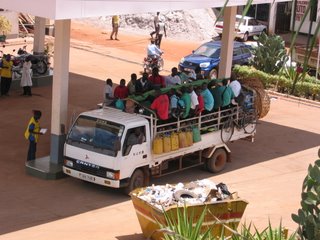 Things that I love about Uganda...I came up with a list of things that are frustrating and things that I love about being here in Uganda. But I always like to end on a positive note so I will begin with:Things that are frustrating or have to be endured in Uganda:
Things that I love about Uganda...I came up with a list of things that are frustrating and things that I love about being here in Uganda. But I always like to end on a positive note so I will begin with:Things that are frustrating or have to be endured in Uganda:- The overpowering and acrid smell of body odor.
- Not having enough medications to treat all of the sick children brought to us.
- Pesky flies that dive bomb into your mouth, eyes, and ears!
- Government soldiers riding in the backs of small pickups (Toyota Hilux) with their large loaded weapons (AK 47's and bigger) pointed casually at all of the people, myself included!
- Malaria, Tuberculosis, HIV/AIDs, STD's, Malnutrition, running rampant without treatment.
- Powerful storms that disrupt our mobile clinic.
- Small children forced by circumstance to carry heavy loads for miles.
- Disabled people that do not have any type of mechanical aids to assist them.
- Power outages at any time and frequently.
- And many more...!
Things I love about East Africa...
- The incredible storms with thunder and lightning from the safety of a porch.
- The friendly people whose faces light up when they smile.
- The flowering trees and bushes with bright colors.
- The variety of fruit and vegetables.
- The way the individual family gardens/crops are growing so nicely now. The maize is so tall with lots of sunflowers interspersed. There are beans, potatoes, greens, eggplant, and so much more.
- The way the hills are so green now with all the rain.
- New friends from all over the world here working in with different ministries and organizations.
- That anything can and will be carried on a wooden wheel barrow or on a bicycle.
- That the occupancy for most bicycles is 4, two adults and two children, 10 chickens, and a goat or two.
- Going to the market is such an adventure with various smells, a plethora of colors, an endless variety of goods. The fish comes fresh in large baskets from Lake Kyoga not too far away. And there are seamstresses willing to make you a shirt or dress any style you want.
- The chicken is so fresh at our restaurant that it arrives hanging upside down still blinking and breathing! Ha!
- There is so much more that I love...
I only have a few more days here, and I notice that I am looking at everything intently, as though I am trying to make a deliberate and deep impression on my mind so that I won't forget a thing. My only regret is that I cannot fully share with you everything that I am seeing and experiencing, it is so beautiful and alive, and real! I will miss this place and these people.
But I do look forward to seeing the love of my life, soon, my dear husband of 19 years!
Blessings to you all, Brenda





